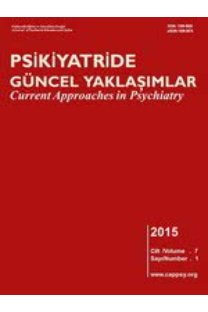Kleptomanide Tedavi Seçenekleri
Kleptomani, Dürtü Kontrol Bozukluğu, Tedavi
Treatment Options in Kleptomania
Kleptomania, Impulse Control Disorder, Treatment,
___
- Amerikan Psikiyatri Birliği. Ruhsal Bozuklukların Tanısal ve Sayımsal Elkitabı, Dördüncü Baskı, Yeniden Gözden Geçirilmiș Tam Metin (DSM-IV-TR), Amerikan Psikiyatri Birliği, Washington DC, 2000, Köroğlu E (Çev. Ed.) Hekimler Yayın Bir- liği, 2007.
- Glover JH.A case of kleptomania treated by covert sensitization. Br J Clin Psychol 1985; 24:213-214.
- Aggernaes M. A study of kleptomania with illustrative cases. Acta Psychiatr Scand 1961; 36:1-46.
- Goldman MJ.Kleptomania, The compulsion to steal - What can be done? New Horizon Press, Far Hills, New Jersey,1998.
- Hollander E ve Wong CM. Obsessive-compulsive spectrum disorders. J Clin Psychiatry 1995; 56 Suppl 4:3-6.
- Durst R, Katz G, Teitelbaum A, Zislin J, Dannon PN. Kleptomania: diagnosis and treatment options. CNS Drugs 2001; 15:185-195.
- Hocaoğlu Ç, Kandemir G. Kleptomani tedavisinde seçici serotonin gerialım engelleyicisi (SSRI) kullanımı: Üç olgunun sunumu. Klinik Psikofarmakoloji Bül- teni 2004; 14:204-208.
- Grant JE, Potenza MN. Impulse control disorders: clinical characteristics and pharmacological management. Ann Clin Psychiatry 2004; 16:27-34.
- McElroy SL, Pope HG, Hudson JI., Keck PE, White KL. Kleptomania: a report of 20 cases. Am J Psychiatry 1991; 148:652-657.
- Grant JE, Kim SW. Clinical characteristics and associated psychopathology of 22 patients with kleptomania. Compr Psychiatry 2002; 43:378-384.
- Kraus JE. Treatment of kleptomania with paroxetine. J Clin Psychiatry 1999; 60:793.
- Lepkifker E, Dannon PN, Ziv R, Iancu I, Horesh N, Kotler M. The treatment of kleptomania with serotonin reuptake inhibitors. Clin Neuropharmacol 1999; 22:40-43.
- Koran LM, Aboujaoude EN, Gamel NN. Escitalopram treatment of kleptomania: an open-label trial followed by double-blind discontinuation. J Clin Psychiatry 2007; 68:422-427.
- Kindler S, Dannon PN, Iancu I., Sasson Y, Zohar J. Emergence of kleptomania during treatment for depression with serotonin selective reuptake inhibitors. Clin Neuropharmacol 1997; 20:126-129.
- Camardese G, Picello A, Bria P. Venlafaxine: Successful treatment in impulsive disorders. Psychiatry Clin Neurosci 2008; 62:241-242.
- Fishbain DA. Kleptomanic behavior response to perphenazine-amitriptyline HCL combination. Can J Psychiatry 1988; 33:241-242.
- Kmetz GF, McElroy SL, Collins DJ. Response of kleptomania and mixed mania to valproate. Am J Psychiatry 1997; 154:580-581.
- Chong SA, Low BL. Treatment of kleptomania with fluvoxamine. Acta Psychiatr Scand 1996; 93:314-315.
- Dannon PN. Topiramate for the treatment of kleptomania: a case series and review of the literature. Clin Neuropharmacol 2003; 26:1-4.
- Grant JE, Kim SW. An open-label study of naltrexone in the treatment of kleptomania. J Clin Psychiatry 2002; 63:349-356.
- Kim SW. Opioid antagonists in the treatment of impulse-control disorders. J Clin Psychiatry 1998; 59:159-164.
- Grant JE, Kim SW. Adolescent kleptomania treated with naltrexone-a case report. Eur Child Adolesc Psychiatry 2002; 11:92-95.
- Grant JE. Outcome study of kleptomania patients treated with naltrexone: a chart review. Clin Neuropharmacol 2005; 28:11-14.
- Dannon PN, Lowengrub KM, Iancu I, Kotler M. Kleptomania: comorbid psychiatric diagnosis in patients and their families. Psychopathology 2004; 37:76-80.
- Grant JE, Kim SW. A case of kleptomania and compulsive sexual behavior treated with naltrexone. Ann Clin Psychiatry 2001; 13:229-231.
- Grant JE. Understanding and treating kleptomania: new models and new treatments. Isr J Psychiatry Relat Sci. 2006; 43:81-87.
- Grant JE, Kim SW. Temperament and early environmental influences in kleptomania. Compr Psychiatry 2002; 43:223-228.
- Bayle FJ, Caci H, Millet B, Richa S, Olie JP. Psychopathology and comorbidity of psychiatric disorders in patients with kleptomania. Am J Psychiatry 2003; 160:1509-1513.
- Milton S, Crino R, Hunt C, Prosser E. The effect of compliance-improving interventions on the cognitive-behavioural treatment of pathological gambling. J Gambl Stud 2002; 18:207-229.
- Hodgins DC, Peden N. Cognitive-behavioral treatment for impulse control disorders. Rev Bras Psiquiatr 2008; 30(Suppl I):S31-40.
- Guidry LS. Use of covert punishing contingency in compulsive stealing. J Behav Ther Exp Psychiatry 1975; 6:169-169.
- McConaghy N, Blaszczynski A. Imaginal desensitization: a cost-effective treatment in two shop-lifters and a binge-eater resistant to previous therapy. Aust NZJ Psychiatry 1988; 22:78-82.
- Marzagao LR. Systematic desensitization treatment of kleptomania. J Behav Ther Exp Psychiatry 1972; 3:327-328.
- ISSN: 1309-0658
- Yayın Aralığı: 4
- Başlangıç: 2009
- Yayıncı: Psikiyatride Güncel Yaklaşımlar
Depresyon ve N-Metil D-Aspartik Asit (NMDA) Reseptör İlişkisi
Vahap Ozan Kotan, Salih Saygın Eker, Enver Yusuf Sivrioglu, Cengiz Akkaya
İnternet Bağımlılığı ve Tedavisi
Psikiyatrik Açıdan Evlilik ve Cinsellik
Murat Gülsün, Mehmet Ak, Ali Bozkurt
Depresyon Patofizyolojisinde Hipokampusun Rolü
M. Çağdaş Eker, Özlem Donat Eker
Mehmet Ak, Murat Gülsün, K. Nahit Özmenler
Depresyon, Nöroplastisite ve Nörotrofik Faktörler
Zeynep Kotan, Aslı Sarandöl, Salih Saygın Eker, Cengiz Akkaya
